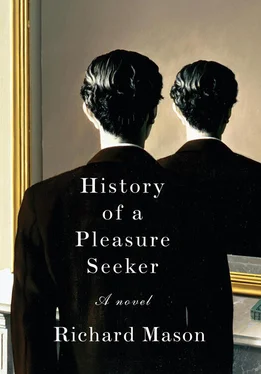Piet had expected a bonus. He had not imagined it would be accompanied by a life-changing offer. He looked at the money and the miniature in his lap. They represented freedom, the capital to make his own way. They were what he had come to Amsterdam to seek. A job with Maarten would mean more of a life he had already glimpsed. And then there was the question of Jacobina … It seemed that the opportunity had arisen to exit with honor from the Vermeulen-Sickerts’ lives and he was minded to take it.
“I am grateful for this gift and for your confidence, sir,” he said, finally. “But for the moment I am very happy as Egbert’s tutor, and after that I wish to work for myself, and no other man.”
Maarten clapped him on the back. “If that is your answer, I shall not dissuade you from it. The best strike out on their own. When the moment comes, you must go into the world and make your fortune as I did.”
“That is my intention.”
“And an admirable one. Keep that man on a tightrope ever beside you. He will protect you from harm.”
“I shall treasure him.”
The next day was a Saturday. Didier had one good suit of his own and Piet loaned him an Hermès tie and a set of studs and squeezed his large feet into a pair of Maarten’s discarded shoes. He was not superstitious and had no intention of keeping the miniature Maarten had given him, but he knew that guile — and a guileful accomplice — would be required to realize its full value.
They left the house looking like gentlemen of good family and ample means and exploited this impression at three of the city’s leading silver galleries. Piet had watched many young men in Leiden liquidate their possessions and knew better than to appear at all anxious for money. He also knew that good prices are paid only to those with the confidence to decline bad ones. He had no idea what the thing was worth so he decided that no sum would tempt him to sell to the first two buyers. This allowed him to bluster convincingly with the third.
He and Didier presented themselves as cousins and the object as an unwanted gift from Didier’s father. They elicited promises of absolute discretion.
“I shall wait, naturally, a dignified interval before offering it for sale,” said the gentleman to whom Piet finally sold it. “And I will not put it in the shop window. We would not like to cause your uncle any offense.”
“No indeed.” Didier frowned. “I’m afraid my father would be extremely displeased.”
“And his father is extremely alarming when displeased,” added Piet.
The dealer smiled. He had paid an approximately fair price, much against his usual custom, but he had also been prepared to offer more. Now he disparaged his purchase to make the young gentlemen feel they had done well out of him. “You may rest easy, dear sirs. Though charming and undoubtedly finished by hand, this miniature is made from a mold. There are others in existence. Even if your uncle were, by chance, to encounter it, he would not be able to tell that it was the one he gave you.”
The young men left the shop, arm in arm. Didier was thrilled by Piet’s bravado and proud to be walking beside him. He was also proud of himself because he was not jealous of Piet’s sudden luck. He cared for him enough to rejoice in his blessings. “What will you do with all this money?”
“Buy passage to New York on a wonderful ship. I don’t mean to go steerage, either.” Piet’s impersonation of a gentleman of means had worked its magic on him and his imagination had polished his future to a high sheen. He did not intend to sleep on planks with hordes of snoring immigrants now that he could avoid it.
Didier put his arm around Piet’s shoulder, to show that he did not resent his good fortune, and ruffled his thick, sweet-smelling hair. “Why leave Holland? Everything for a happy life is here.”
“There’s no adventure in staying in the same place and I mean to have adventures. If you’d come with me to buy my ticket, we can celebrate with wild drunkenness and a fine dinner. The expense will be mine.”
Didier Loubat had long since given up hoping for a drunken night with Piet Barol and the sudden granting of one made him feel that the day was glorious for him, too. “It’s the least you can do, you lucky bastard,” he said gruffly, and made a show of pushing his friend into the gutter.
They went to the offices of the Loire Lines, an ornate building on the Damrak. As they passed beneath the crossed gilt L s set in a marble shell above its door, the doorman bowed so low that Piet was briefly ashamed to join the throng at the third-class window. His hesitation confirmed the doorman’s first assessment. He pressed a discreetly placed bell, which summoned a deferential official. This gentleman escorted Piet and Didier to a private office and assured them of his very best attention at all times.
“May I ask your destination, my dear sirs?” Karel Huysman took his seat beneath a framed oil painting of the liner Eugénie .
The picture reminded Piet of Constance’s handsome, unpleasant friend, who had refused to travel on any other ship. “I’m inclining towards New York.” He spoke languidly, still acting the part he had reprised for the silver dealers. “I’ll be traveling alone but I insist on the Eugénie .” It gave him great pleasure to mimic an aristocrat’s prejudices before a credulous audience and Didier. He decided to bluff here as long as it amused him and buy his ticket elsewhere.
Mr. Huysman’s face fell. “A most judicious choice, may I say. But the Eugénie is full in first class for the next four years. Now the Joséphine is—”
“But I insist on the Eugénie .”
Mr. Huysman inclined his head. “And very wise you are to do so. Many notable Americans reserve their favorite cabins for every crossing, merely to keep them permanently at their disposal. It is, of course, their right, but so inconvenient for others.” He looked down at the ledger before him. “Tourist class to New York is also full until the middle of 1909, I regret to say.”
“No matter.” Piet stood up. “I’m told Cunard’s Mauretania is very comfortable.”
But Karel Huysman’s competitive instincts were aroused. “You will find that Cunarders fall regrettably short of our standards, sir. I should not forgive myself if you had an uncomfortable voyage.” He had correctly assessed his young client as an adventurous type. “Perhaps I might suggest an alternative. Will you be traveling for business or leisure?”
“Leisure, naturally.”
“There is a berth in tourist class. Just one, in a shared cabin. Departing January 18th.”
“My cousin only travels first class.” Didier also rose.
“Quite so.” Mr. Huysman smiled. “But tourist class on the Eugénie is in every way superior to first class on every other ship. Besides, her January voyage will be an event to describe to your grandchildren.” He lowered his voice. “She is christening the company’s new service to South Africa. En route she will call at the island of St. Helena. How many can boast of having seen it? A ball is being given there in aid of orphaned infants. It will be talked of for years to come — though unfortunately all the tickets have long since been sold.” He drew breath and smiled. “Would you at all consider Cape Town? It is a city full of opportunities for enterprise and pleasure.”
“My cousin doesn’t—” began Didier.
“It would be remiss of me not to mention,” Mr. Huysman continued, “that though the voyage will last seventeen days, it will cost only a trifle more than the six-day crossing to New York.” He pointed to a number on a list in front of him and slid the paper towards Piet. “This represents a superb compromise between quality and value.”
Читать дальше












